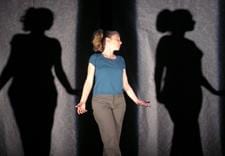Some women glow when they’re pregnant. Others, like lesbian writer/performer Diane Flacks, turn into raging lunatics.
“It’s not something you hear much about, even in the books,” says Flacks of her Incredible Hulk-style mood swings. “I guess there’s a sense of not wanting to be a downer about pregnancy. So I thought, ‘Well, I’ll be a downer.’” True to her word Flacks went on to write a tell-all book and show about her experiences. Bear with Me, the stage version, makes its Toronto debut this month.
Part standup, part confessional, the show is a warts-and-all account of Flacks’ own pregnancy, sprinkled with home truths about childbearing. It’s a million miles away from any saccharine guide to parenting because Flacks wrote it from the trenches. “My son, Eli, was 11 weeks old and I was a lunatic,” she says. “I had to write about something so I thought, yes, this will be the flavour of the book: lunacy.” The stage adaptation takes full advantage of the pregnant body’s potential for physical comedy. Case in point: The only prop is a giant red Pilates ball. Don’t ask Flacks how she plans to use it — she won’t tell.
A veteran of stage and screen, Flacks has appeared in countless television shows and even written material for Kids in the Hall. She’s been collaborating with Nightwood — Canada’s national women’s theatre company — for around 17 years. In fact the idea for adapting Bear with Me was dreamed up by Nightwood’s artistic director Kelly Thornton. At the book’s launch party Thornton watched Flacks make the entire room whoop with laughter by reading an excerpt. “I thought, ‘Hey, this would make a great piece of theatre,’” says Thornton. “It’s an amazing journey, one of incredible challenges and huge heights of joy.”
Adapting the book was “way harder” than Flacks expected it to be. “We read through and decided what stories we could do fun things with,” Flacks says, “Then we said, ‘Okay, but what is the journey of this person?’” Because the story moves back and forth in time, the audience knows upfront that there’s a baby at the end of it. A conventional narrative structure just wouldn’t work. Nevertheless, there is a kind of dramatic tension that runs through the piece — loss of control over a “science fiction” body is a compelling theme.
And Thornton’s direction is key to keeping it dynamic. “Dramatically there has to be a climax,” says Thornton. “That comes in moments when she has to talk about both life and death. As a director, you want to get the performer to that really honest place.”
In fact Flacks’s emotional journey began before conception. She and partner Janis Purdy didn’t plan on Flacks becoming the biological mother. “I was not the mothering type,” she admits in the show. “I was too small, busy, goofy. I dress like a teenage boy.” But when Purdy struggled to conceive, Flacks stepped up to the plate. To her surprise, it worked almost immediately. Her transition from happy-go-lucky tomboy to grudging earth mother is both amusing and poignant. “I came to motherhood almost reluctantly,” she says, “which is an interesting way to come to it because it felt like I was doing it totally out of choice.”
Choosing which partner to inseminate is a specifically lesbian dilemma but anyone who has experienced fertility issues can relate. This is just one example of how the show is nuanced — but not dominated by — Flacks’ sexuality. “Being a lesbian makes me who I am and it’s written from my point of view,” she says. “But what’s so liberating about the fact that we’re doing it this way is that you don’t naturally slip into mummy and daddy roles. Some of my straight friends default into it because they’re programmed that way. In our case you kind of default into what’s pragmatically necessary.” As the parent who stays home with the kids, Flacks is the “mummy” of conventional stereotype. “But I don’t accept it,” she says, “because I’m not somebody’s wife!”
Adding a second child to the family hasn’t dampened Flacks’ resolve to blow parenting myths out of the water. Purdy gave birth to their second son, Jonathan, in 2006, and his arrival gave rise to some interesting questions of nature versus nurture. “What we’ve discovered is that it’s not biology that bonds children to parents in the early years,” she says. “They both bonded to me because I’m the one who’s at home the most.” When she’s not wrangling toddlers Flacks writes a biweekly column for the Toronto Star called In the Thick of It. Regular work plus two kids has made her an expert in multitasking. “What I can now do in 40 minutes took me much longer before,” she says with a laugh.
The family live in a “ramshackle, kid-spattered, Play-Doh-encrusted,” Victorian semidetached in Riverdale. A number of their close neighbours are gay men and lesbians; many members of the local community have children. They’ve never experienced any discrimination as a family, which isn’t something Flacks will ever take for granted — after all, she says, “we are Canadian.”
“I feel so lucky to be in this city at this time,” she adds. “My partner and I have been fully embraced and there’s been no issue. We chose a school for my eldest where there are two other kids in his class with lesbian moms. Just his class. So that’s a critical mass already.”

 Why you can trust Xtra
Why you can trust Xtra


